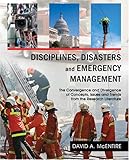Disciplines, disasters, and emergency management : the convergence and divergence of concepts, issues and trends from the research literature / edited by David A. McEntire.
Material type: TextPublication details: Springfield, Ill. : Charles C Thomas, c2007.Description: xxv, 344 p. : ill., map ; 26 cmISBN:
TextPublication details: Springfield, Ill. : Charles C Thomas, c2007.Description: xxv, 344 p. : ill., map ; 26 cmISBN: - 9780398077433 (hard)
- 9780398077440 (paper)
- 364.348 22
- HV551.2 .D583 2007
| Item type | Current library | Collection | Call number | Status | Date due | Barcode | |
|---|---|---|---|---|---|---|---|
 Books
Books
|
Australian Emergency Management Library | BOOK | 363.348 DIS (Browse shelf(Opens below)) | Available | 900179773 |
Browsing Australian Emergency Management Library shelves, Collection: BOOK Close shelf browser (Hides shelf browser)
Includes bibliographical references and index.
Ch. 1. The Importance of Multi-and Interdisciplinary Re-search on Disasters and for Emergency Management / David A. McEntire<BR> Ch. 2. Geography?s Contributions to Understanding Hazards and Disasters / James M. Kendra<BR> Ch. 3. METEOROLOGY, Weather and Emergency Management / Kent M. McGregor<BR> Ch. 4. Engineering?s Contribution to the Field of Emergency Management / Ana Maria Cruz<BR> Ch. 5. Sociology, Disasters and Emergency Management: History, Contributions, and Future Agenda / Thomas E. Drabek<BR> Ch. 6. Research about the Mass Media and Disaster: Never (Well Hardly Ever) the Twain Shall Meet / Joseph Scanlon<BR> Ch. 7. Disasters: A Psychological Perspective / Margaret Gibbs and Kim Montagnino<BR> Ch. 8. Anthropological Contributions to the Study of Disasters / Doug Henry<BR> Ch. 9. Social Work and Disasters / Michael J. Zakour<BR> Ch. 10. U.S. Disaster Policy and Management in an Era of Homeland Security / Richard T. Sylves<BR> Ch. 11. Public Administration, Emergency Management, and Disaster Policy / William L. Waugh, Jr.<BR> Ch. 12. International Relations and Disasters: Illustrating the Relevance of the Discipline to the Study and Profession of Emergency Management / David A. McEntire<BR> Ch. 13. Comparative Politics and Disasters: Assessing Substantive and Methodological Contributions / David A. McEntire and Sarah Mathis<BR> Ch. 14. The Contribution of Management Theory and Practice to Emergency Management / John C. Pine<BR> Ch. 15. Gerontology and Emergency Management: Discovering Pertinent Themes and Functional Elements within Two Disciplines / Kathy Dreyer<BR> Ch. 16. Public Health and Medicine in Emergency Management / Richard A. Bissell<BR> Ch. 17. Who?s in Charge Here? Some Observations on the Relationship between Disasters and the American Criminal Justice System / Robert J. Louden<BR> Ch. 18. Economic Applications in Disaster Research, Mitigation, and Planning / Terry L. Clower<BR> Ch. 19. Emergency Management and Law / William Charles Nicholson<BR> Ch. 20. Environmental Management and Disasters: Contributions of the Discipline to the Profession and Practice of Emergency Management / John R. Labadie<BR> Ch. 21. Communication Studies and Emergency Management: Common Ground, Contributions, and Future Research Opportunities for Two Emerging Disciplines / Brian K. Richardson and Lori Byers<BR> Ch. 22. Business Crisis and Continuity Management / Gregory L. Shaw<BR> Ch. 23. Information Disasters and Disaster Information: Where Information Science Meets Emergency Management / Tisha Slagle Pipes<BR> Ch. 24. Making Sense of Consilience: Reviewing the Findings and Relationships among Disciplines, Disasters and Emergency Management / David A. McEntire and Sarah Smith.
"Disasters such as the 9/11 terrorist attacks, the Indian Ocean Tsunami, and Hurricane Katrina illustrate the salience and complexity of disasters. Both scholars and practitioners therefore agree that we must take a more proactive and holistic approach to emergency management, which should logically be derived from a sound understanding of the academic literature and the most pressing concerns facing professionals in the field today. Disciplines, Disasters and Emergency Management reviews what is known about catastrophic events from the standpoint of various academic areas of study. The introductory chapter by the editor, David A. McEntire, discusses the importance of and difficulties associated with multi- and interdisciplinary research on disasters and emergency management. Well-known scholars such as Drabek, Gibbs, Pine, Scanlon, Sylves, Waugh, Zakour and others then join efforts with budding students who have recently been exposed to the disaster management profession. Their review of our current level of knowledge represents 23 disciplines including geography, engineering, sociology, gerontology, public administration, international relations, law, environmental management, criminal justice, and information science, etc. The concluding chapter summarizes the contributions of various disciplines, identifies potential research opportunities, and describes ways to address future disaster problems. Besides comparing the similarities and differences among the findings from diverse fields of study, Disciplines, Disasters and Emergency Management suggests that scholars may increase their comprehension of disasters by focusing attention on the unique concept of vulnerability. Recommendations for disaster reduction also make this a useful book for professionals in emergency management. Whether you are a seasoned expert in disaster research or a novice in emergency management, this book will help you acquire cutting-edge knowledge about disasters and emergency management." -- BOOK JACKET.
There are no comments on this title.





